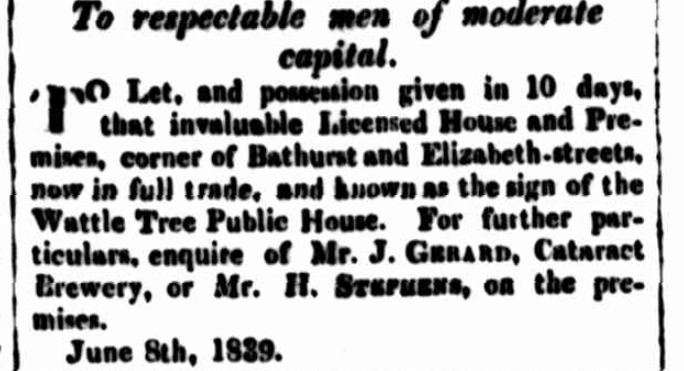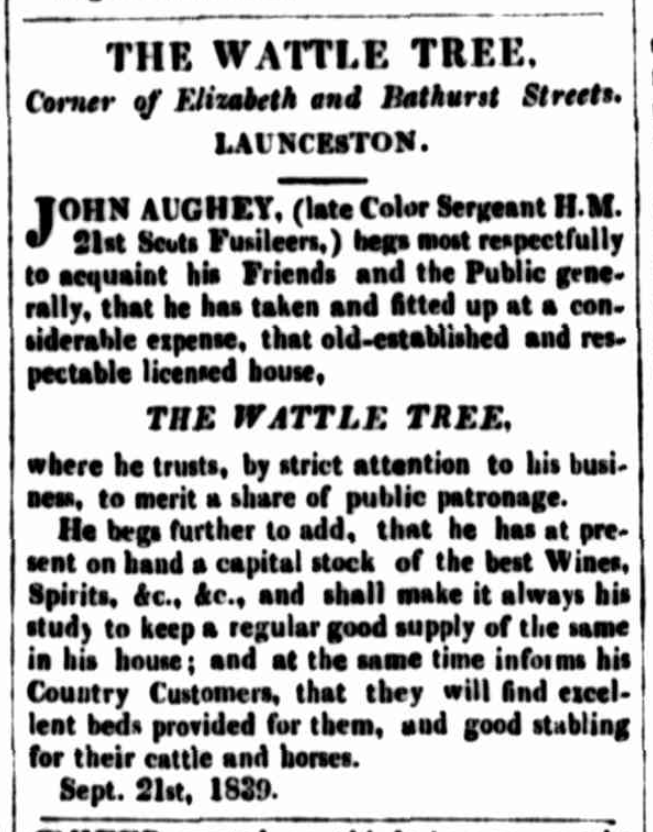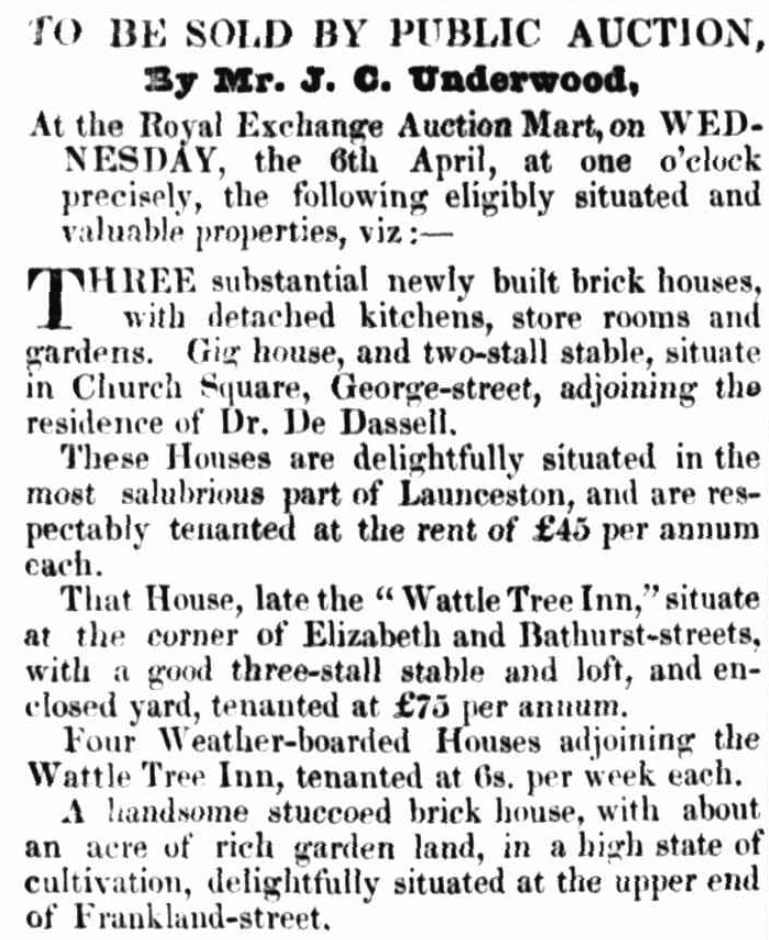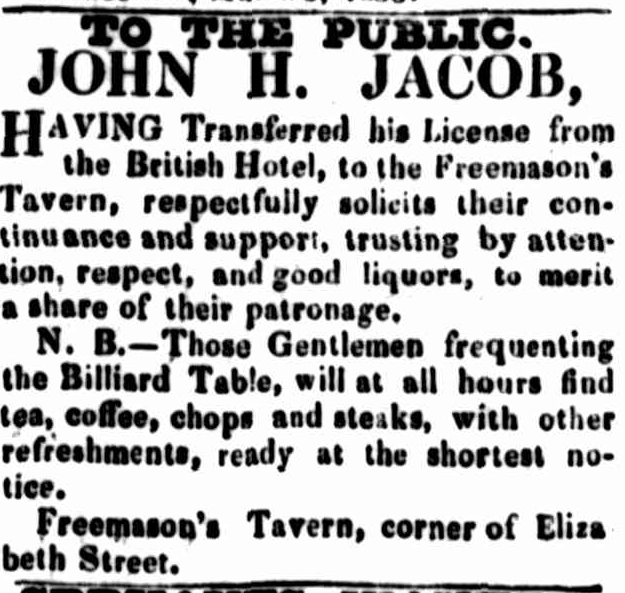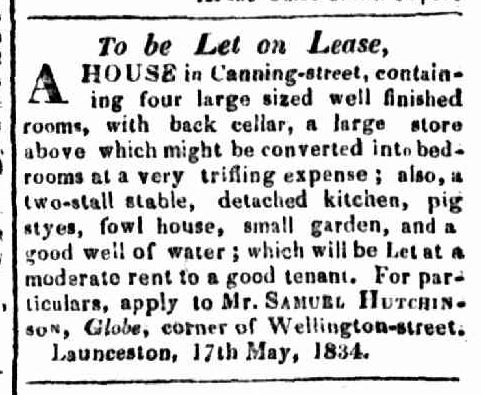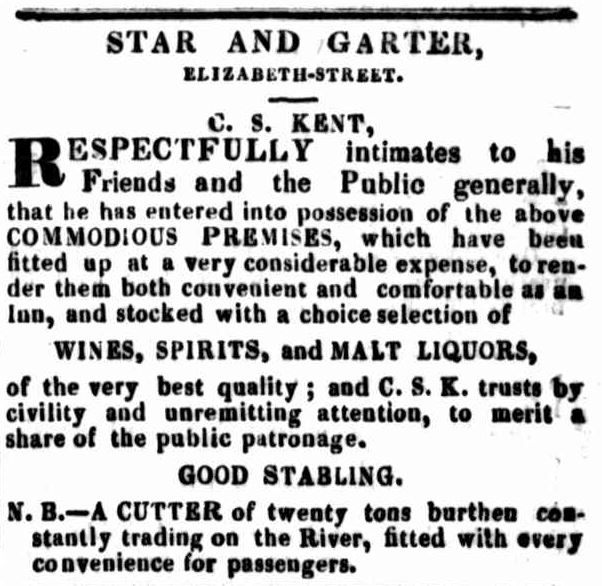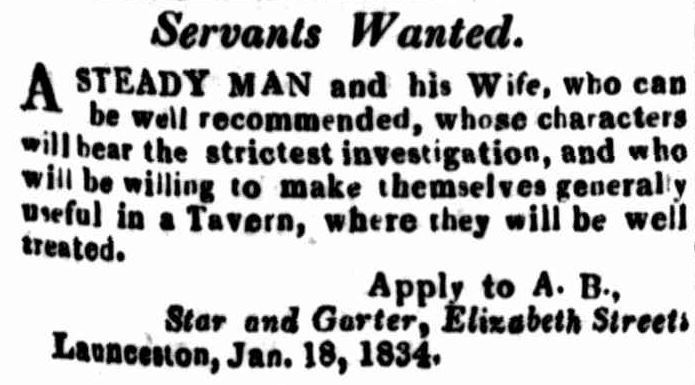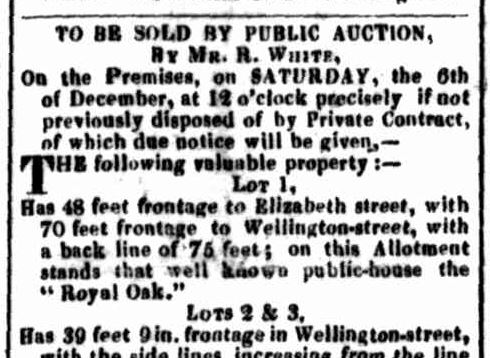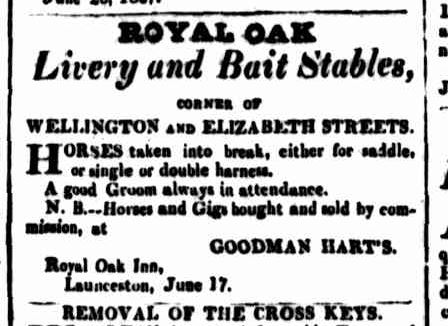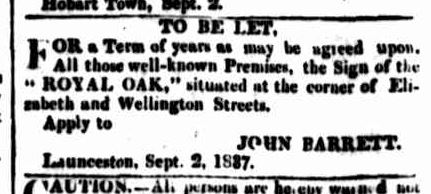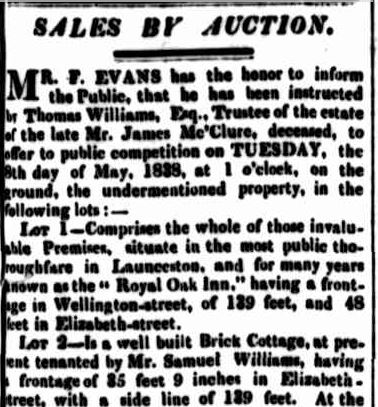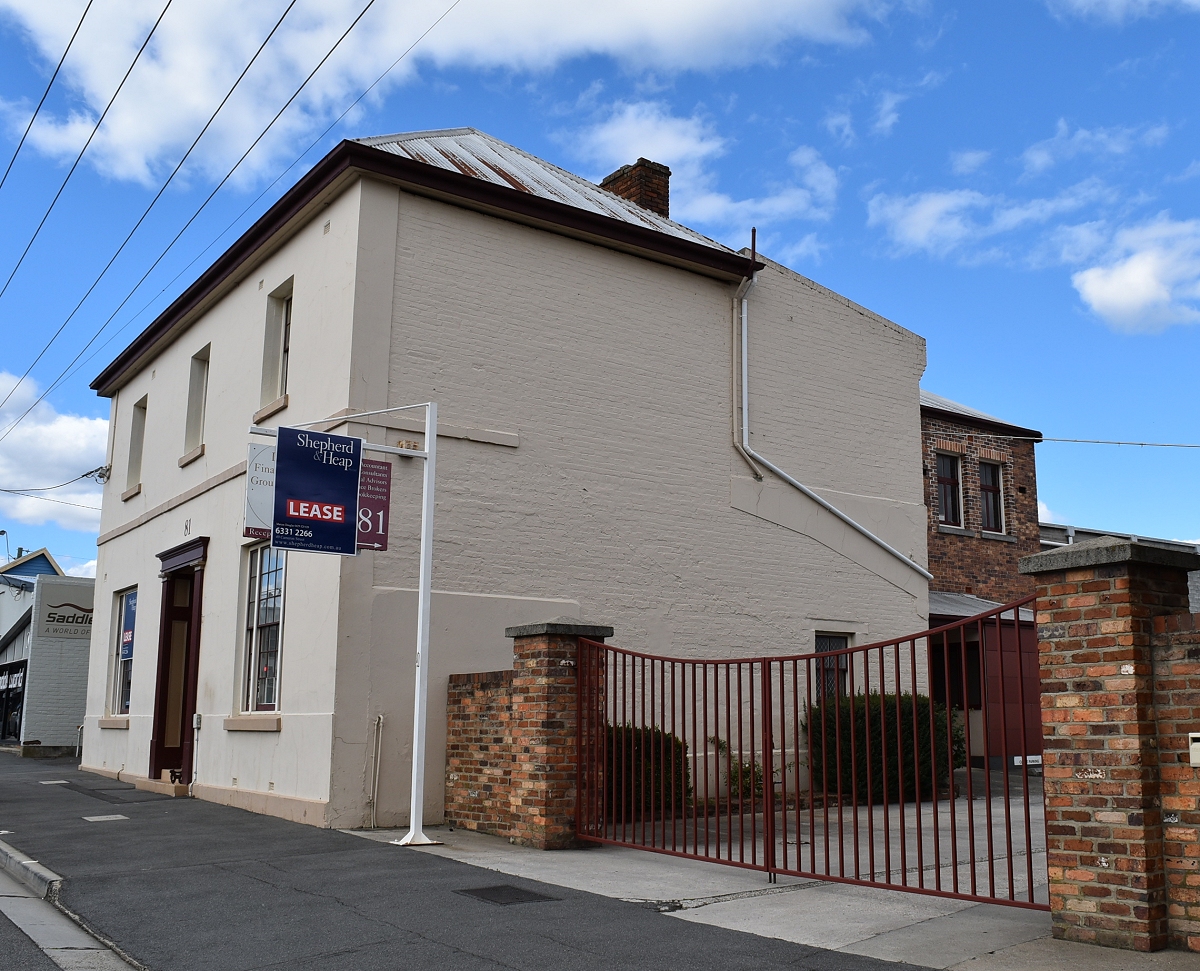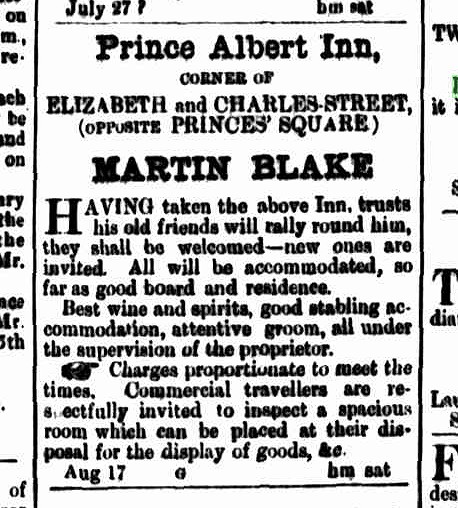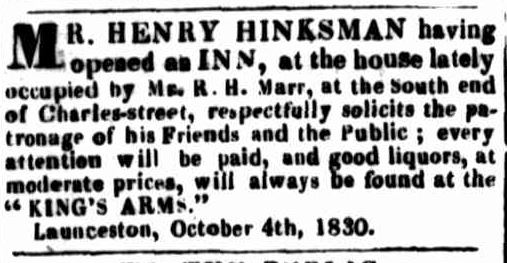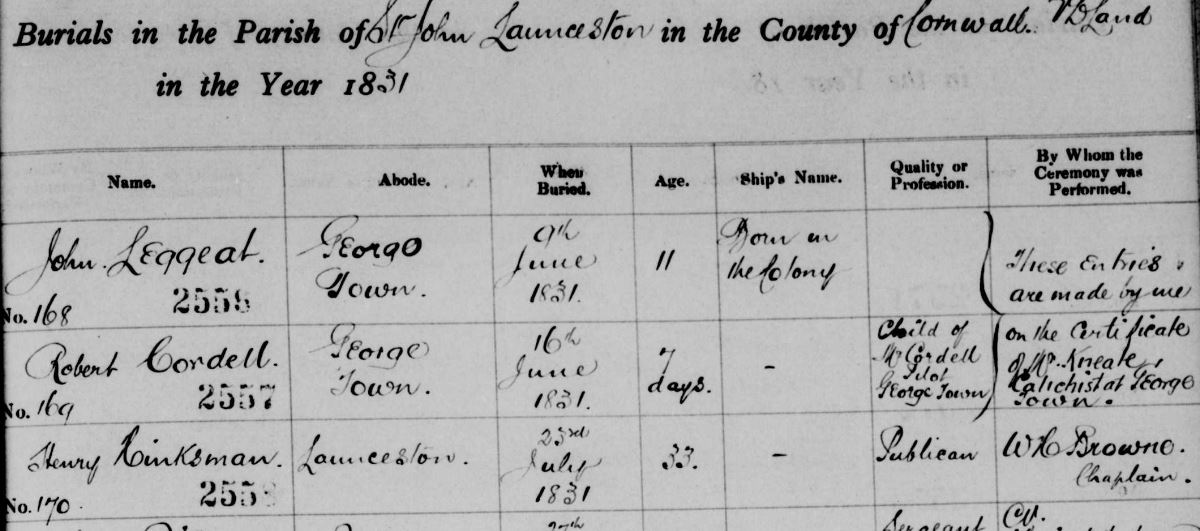Elizabeth Street
1844 Stephen Murphy, Elizabeth Street
1845 Stephen Murphy, Elizabeth Street
1846 Richard Wicks transfer
1846 Refused
Application for music and dancing license:
An application from Stephen Murphy, of the ‘Young Queen,’ Elizabeth-street, was refused ; not having a room in the house adapted for such a purpose.
Launceston Advertiser, 8 January 1846
To the Editor of the Cornwall Chronicle.
Sir, — When I have had business at Launceston I have been accustomed to stop at Mr. —s, the “— —,” in — street. I went there on Saturday-night, August 8, where I had stopped the two preceding nights. This was about shutting-up time for publicans, some being shut up as I passed along the streets and some not, but when I came to the “— ,” it was shut. I knocked at the door, and it was immediately opened by Mr. — — . I went in through the bar into the little parlour, where the family and customers frequently sit, and after sitting a few minutes I said to Mr — , “well, I think I’ll have a glass of beer, and smoke my pipe, and be off to bed.” In four or five minutes be brought the beer in and I paid him for it, and when I had smoked my pipe and drank up my beer, I asked Mr. — for a candle, which he gave me, and bidding him “good night,” I went up stairs to my bedroom; but instead of immediately undressing myself, I sat as near as I can judge about a half an hour, looking into two little books; but feeling very sleepy, I undressed myself, set a chair to my bed-side, and put the candlestick on it, so as to be able to reach to put the candle out after lying down. Just at the time I bad taken the candlestick in my hand to put the light out, Mr. — came into the room very gently; he did not speak at the very moment, but seemed confused, as I thought; after collecting himself be said, “I’m come up to see if you have lost anything. Is your money all right?” I said “yes, for anything I know, it is, but I’ll see,” and getting up I examined my trousers pocket, and took my silver out and laid it on the table, saying “that’s all right, there should be nearly a pound’s worth and there’s not far short by the appearance of it,” but did not count it. He then said, “where’s your other money : where’s your pocket book .” I said “that’s right I know, for I had it in my hand a few minutes ago, and it was right then, and its contents too,” but to satisfy him, I took my book from my inside waistcoat pocket and laid it on the table, saying ” that’s right” but did not open it. He then said, “you’re sure all’s right?” and I told him “all’s right.” He then said, “you’d better fasten your door inside, here’s a bolt under the lock. I tried to shoot the bolt but could not, as the end of the. bolt would not reach into the box, so that the door was only closed by the common spring bolt. I then returned to bed, but before I put the light out I said within myself, “I’ll not leave my book lying on the table,” and put it under my pillow, and then put the light out, and was soon too fast asleep, How long I slept I am unable to say, but when I awoke, or was awakened, I found myself in the most excruciating pain at my stomach, and so sick that I thought my heart must and would come up; still I could throw nothing up, though I tried every means I was able. I tried to get up and get to the door, and call for help, but the giddiness in my bead was so great that 1 could not even sit up in my bed, which seemed to turn round in the quickest motion, and what is singular I retained the possession of my senses. How long the pain continued so very violent I cannot exactly say, but to the best of my judgment about two hours, when it was a little easier, and I fell asleep again, and slept till daylight, still being very unwell. A few minutes after I awoke, I got up, end after dressing myself I took my silver from the table and counted it, and put it in my pocket. There was 19s. 6d. 1 then went to the pillow for my book, and it was not there. I then turned the bed clothes down, supposing , it had worked down further into the bed, but it was not there. I then turned the bed down, and found it between the bed and mattress. I immediately perceived it had been opened, from the stiring that passes round it being tied very different to the manner I always tied it myself, and on opening it I found my money was gone. I immediately went down stairs and said to Mr ? — , “”what reason had you for coming into my room to inquire about my money last night?” He answered, “you went out here last night with one of the biggest rogues in the country (but I now think I left a bigger one in.) and I thought he might have picked your pocket, and you might not find it out before morning, and then you might think you had been robbed here. I should not have come up, but the young man that lodges here recommended me to come on that account.” I answered, “that man I can clearly exonerate, as I changed a note at the “— Tavern” more than an hour after he left me, and my money was all right then; and I never was in any company afterwards, or in any house whatsoever, until I came in here.” Shortly after I saw Mrs. — , who said, ” well, you’ve been done to-night?” “Ah,” said Mr. — , “he says he’s been robbed of his money, and says he’s lost it here.” “Ah,” answered Mrs. — , “I thought he’d lost it last night, that made me send you up-stairs to see about it.” I then turned to — and said, “I understood the young man that lodges here wished you to speak to me about it.” Here he was evidently much confounded, and falteringly said, “no, it was my wife,” and she repeated the words “it was me that sent him up,” and here the conversation ended. Now,
Sir, several inferences may be drawn from the above account, as to who was the rogue; but as I am but little judge about such matters myself, 1 must beg of your readers to judge for me.
A Wayfarer.
August 19 .
Cornwall Chronicle, 22 August 1846
To the Editor of the Cornwall Chronicle.
Sir, — Having seen a letter in your last Saturday’s newspaper, signed, ” A Wayfarer,” having reference to some dishonest conduct on the part of an Innkeeper, and being informed that I am the person intended, I beg to call your attention to the real facts of the case, which are, altogether different, from those which have been stated. About three weeks ago, Saunders came to my house, and remained three days; on the Saturday afternoon he went out, and returned with a common prostitute, whom Mrs. Wicks would not allow to enter the parlour behind the bar; she then went away; he remained a little while, and drank a class of beer, and then went out again : this was about three o’clock in the afternoon; he came back again about five o’clock with a person whom he represented as the steward of the City of Sydney; he then told me he would go by the City of Sydney to Port Phillip (instead of to Adelaide); they drank four glasses of ale each; he brought out his pocket-book in the presence of this man, and looked at some papers; he (the steward) immediately induced him to leave my house, for the purpose of engaging his passage per City of Sydney; on their leaving, the remark was made, “that the man who had just left was imposing on Saunders, as the steward of the City of Sydney was a Chinese boy, and formerly cook to Mr. Raven;” I intended at that moment to prevent his going out, but had occasion to go into the tap-room to serve a customer; he left before I came back again into the parlour; he returned again shortly after ten o’clock — very drunk; his right eye cut and bleeding; he accounted for it by. saying, “the woman had done it who followed him this afternoon.” On being asked, what induced him to go into her company after Mrs. Wicks expostulating with him this afternoon? he said, “he went into a house to take a glass of ale with the steward, and during the time he was there, this woman came in, and struck him in the eye with an umbrella;” he then sat down on the sofa — appeared thoughtful and uneasy in his manner, so much, that three people who were present remarked it; after sitting about half an hour, he went to his bed; the parties who were in the parlour requested me to go up and see if he had lost anything, as they suspected something was not right — both from his manner and his constant manner of “flashing” his pocket-hook; I went up; he was sitting up in bed with the candle close to the curtains; I requested him not to put the light so near the bed; he said he was going to read a book; I said I have come up to see if your money is all right; he got out of bed and took from his trowsers pocket some silver; lie said he had changed a pound; I said there is nearly a pound’s worth there; I then asked him if his pocket book was all right; he took it from his waistcoat, but repeatedly refused to open it in my presence, saying he knew it was all right; I requested him to bolt his door; he attempted to do so, but on account of the door not being sufficiently close, it did not catch; I then held it for him on the outside until he had securely fastened it. I told the persons in the parlour that Saunders said his money was all correct. In the morning he asked the reason for my asking him if he had his money all right; I said, he seemed so uneasy that I and the other persons present suspected he had been robbed by the same parties who cut his eye; he then said he had lost three one pound notes, and that his money was quite correct when he changed the note, but be would go back to the place and see if he had dropped it; on his return he said the landlady had told him he wrapped up his pocket-book again, and lost nothing there; he then accused the young man who slept in the next room of taking it; I told him it was impossible, as his room-door was fastened on the inside while I was present, and that I had afterwards tried it; he then started for the White Hills; he had been gone about half an hour when he returned and asked me the name of my lodger, saying also, “I have turned back to put you on your puard against him, for I am confident it is he who has robbed me; I again told him the man could not get into his room, and we both went up stairs to examine the state of the lock, and found it in proper order, never having been forced; I again told him he must have lost his money when in company with the man and woman; he replied, “certainly I was in liquor, I might have dropped it when I changed the pound note;” he then left, and returned in about a week and remained until Friday the 21st; and during the whole of the five days he remained here, the last time, he never once mentioned the subject; he left on Friday, without saying a word or paying his bill. He lost money before, about twelve months ago, at the “Golden Lion;” he went out with a female and returned saying he had been robbed. John Kanes, Mr. Noble, painter, and a young man formerly storekeeper to Mr. Stuart Harvey, were the parties to whom I have referred as being in the parlour when I wept up stairs, end can prove that instead of my going up quickly, I ran up in my usual manner, and they heard me open the door.
— I remain, Sir, your obedient servant,
Richard Wicks.
August 29.
Cornwall Chronicle, 29 August 1846
Richard Wicks, Young Queen, Elizabeth-street — House dirty and ill-furnished, and strongly suspected of dishonest practices.
Mr. Jocelyn Thomas stated that a man in his employ had gone into Wicks’s, where he had his beer drugged and was afterwards robbed; it was a most scandalous proceeding.
Mr. Dry wished to know if the statement of the man who had been robbed, brought home a moral conviction in his (Mr.Thomas’) mind as to the guilt of Wicks.
Mr. Thomas. — It did, for the man is about one of the few whom I would believe.
Mr. Tarleton had taken the depositions in the case, and he had not the slightest doubt of Wicks’s guilt, although the charge could not be legally brought home to him.
Mr. Dry.— I hope such conduct will be marked in the strongest manner possible, I was aware of these circumstances before, and entertain the same impression as Mr. Tarleton — unanimously refused.
Cornwall Chronicle, 2 September 1846
Appeal against previous decision:
Richard Wicks, ‘Young Queen,’ Elizabeth Street. Mr. Rocher for appellant.
Mr. Rocher said the license was refused on account of ineligibility of premises, in connection with a charge made by a servant of Mr. J. B. Thomas’s, that he had been supplied with drugged spirits in the house, and robbed. Mr. Rocher called Mr. Bartlett, the publican, who stated that the man referred to had called at his house on the day referred to, in company with two loose women, and was intoxicated; and the counsel argued that the probability was the robbery complained of had been committed by them.
Captain Neilly and Friend stated that they had visited the house, since the annual meeting, and it was in every way suitable; but Mr. Atkinson said that the house was not properly furnished, and Mr. Bartley pointed out the fact that the house was not at all requisite in the neighbourhood.
Captain Gardiner, Mr. Sams, Mr. Wales, and Mr. Sinclair spoke in favour of a reversal of the decision of the annual meeting; but on the votes being taken, the decision was confirmed by 13 votes to 9.
Launceston Advertiser, 24 September 1846
